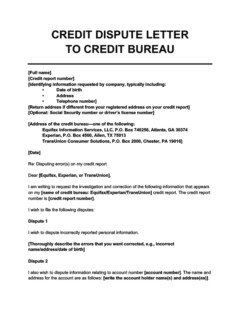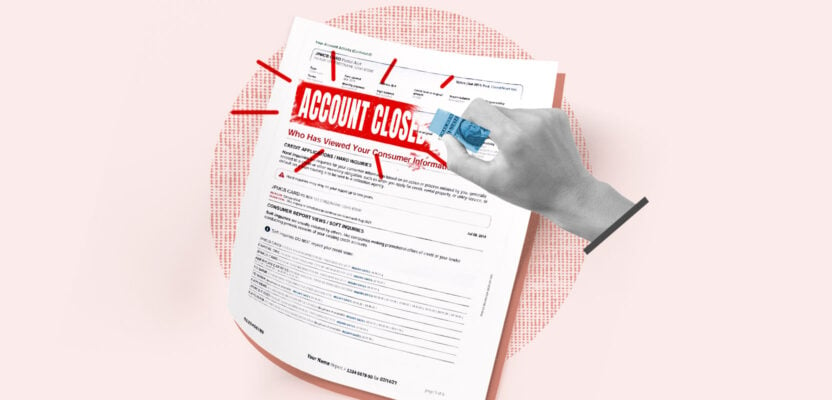When you close a credit account, it doesn’t instantly disappear from your credit history. The credit bureaus keep records of your credit activity long after you close your accounts because your past activity is a major indicator of your creditworthiness.
However, if you’d rather bury the past and never look back, then there are ways you may be able to get closed accounts erased from your credit reports for good.
Table of Contents
How closed accounts affect your credit
Because credit accounts stay in your credit file after you close them, they also keep contributing to your credit score.
Closed accounts on your credit report aren’t always bad, although they aren’t necessarily good either. Their effect can be either positive or negative.
How closed accounts affect your credit score depends on how they contribute to the factors involved in the calculation of your credit score:
- Payment history: A record of whether you’ve paid your bills on time or not.
- Credit utilization rate: The amount of your available credit that you’re using.
- Length of credit history: The age of your various credit accounts (both the overall average and the age of your oldest and newest accounts).
- Credit mix: The variety of credit accounts that you have.
- New credit: A record of whether you’ve applied for new credit recently.
You might expect closing an account to negate its effects on these factors, but in actuality, closed accounts keep affecting them, for better or for worse.
For example, even after you close an account, it’ll keep contributing to your length of credit history or “credit age,” as long as the account is still on your credit reports. 1 Similarly, your payment history on the account will continue to affect your score.
How closing accounts can hurt your credit score
The act of closing a credit account has its own effects on your credit score, depending on the type of credit account it is. For example, closing a credit card will probably hurt your credit by increasing your credit utilization ratio (i.e., how much of your available credit you’re using).
To a lesser extent, the same thing can happen when you close an installment loan. Specifically, paying off debt can sometimes hurt your credit because some credit scoring models reward consumers for having loans that are mostly (but not all the way) paid off. 2
How long do closed accounts usually stay on your credit report?
As we said, closed accounts continue to affect your credit score (by way of your credit age, payment history, and other factors) as long as they remain on your credit report. The table below shows how long closed accounts stay on your report in different situations:
How Long Closed Accounts Remain in Your Credit File
| Type of Account | Characteristics | When It’s Deleted | Who Decides |
|---|---|---|---|
| Positive account | Labeled as “in good standing” or “paid as agreed” | 10 years | The credit bureaus (TransUnion, Equifax, and Experian) |
| Negative account | Associated with late payments, charge-offs, debt settlement, or other derogatory items | 7 years | The Fair Credit Reporting Act (FCRA) |
How to get rid of closed accounts
If you have inactive accounts that you want to delete from your credit report, there are several methods you can try. (To learn whether this is actually a good idea, skip to the end of this article.)
There’s no guarantee that the methods below will work—it’s generally up to the credit bureaus and your creditors, and you’ll have to abide by their decisions. However, it doesn’t hurt to try. Ultimately, you have four main options.
1. Send a dispute letter
The most popular approach to removing items from your credit report by yourself is filing a credit dispute. This method will generally only work for removing inaccurate or unverifiable information from your credit reports; if all the information about the account is correct, your dispute probably won’t be successful.
All you need to do is send a dispute letter. To get started, use the sample letter below for removing closed accounts from your credit report.

Credit Dispute Letter to a Credit Bureau
Use this template to file a dispute directly with one of the credit bureaus. Mistakes in your personal information (e.g., an incorrect address), as well as credit accounts that you don't recognize, should usually be disputed with the bureaus. Often they're the result of the bureau confusing you for someone else.
You only need to send your dispute letter to the credit reporting agencies that are including the closed account in your credit report (TransUnion, Experian, and/or Equifax). If you’re unsure, request your free credit reports from all three credit bureaus at AnnualCreditReport.com.
Where to Send Your Dispute Letter
| Experian | Equifax | TransUnion | |
|---|---|---|---|
| Where to send your dispute letter | Experian P.O. Box 4500 Allen, TX 75013 | Equifax P.O. Box 740256 Atlanta, GA 30374-0256 | TransUnion Consumer Solutions P.O. Box 2000 Chester, PA 19016-2000 |
| What you’ll need to send | |||
| Dispute online | Experian's online dispute form | Equifax’s online dispute form | TransUnion’s online dispute form |
Should you dispute closed accounts on your credit report?
If a closed account is being inaccurately reported—for instance, if you closed it voluntarily but it says that your creditor forcibly closed it because you failed to pay your bills—you should definitely dispute it, because the error might be hurting your credit.
If all the information about the closed account is correct, disputing it probably won’t achieve much, although if you really want to have the account deleted, there’s no reason not to try. (Disputing an account can’t hurt your credit score.)
2. Send a goodwill letter
If you’re trying to delete an account that’s not associated with any outstanding debts (i.e., that you fully paid off), then you may be able to persuade your creditor to delete it out of kindness by sending them a goodwill letter, which you can create with this goodwill letter template.
In your letter, truthfully explain your situation and why you want the closed account removed. Be polite and remember that your creditor has no obligation to fulfill your request.
Should you delete closed accounts with a goodwill letter?
Generally speaking, although deleting a closed account with a goodwill letter can work, it’s not a very good idea. That’s because it mainly works on accounts that you closed in good standing, which don’t hurt your credit—in fact, they benefit it.
In other words, the circumstances in which this method is most effective are also the ones where it makes no sense to try to delete a closed account in the first place.
That said, you can also use a goodwill letter with a debt collection agency to ask them to remove a closed collection account that you’ve paid off. However, your odds of success aren’t very good—you’ll probably have more luck removing collections from your credit report if they’re still unpaid.
3. Try pay for delete
This is a strategy that works for closed accounts that still have an outstanding balance on them. In general, you should pay off closed accounts that you still owe debt on, and by proposing pay for delete, you may be able to get the associated mark removed when you do.
Pay for delete is a negotiation method where you offer to pay your creditor or debt collector the money that you owe them if they’ll remove an item from your credit reports.
As with the other methods, pay for delete involves writing a letter and sending it to the company reporting your account information to the credit bureaus.

Pay for Delete Letter to Collector
Use this pay for delete letter template to ask a debt collection agency to remove a collection account from your credit report. Pay for delete works best on old debts in collection, so this is the scenario the strategy is most suited to.
If you get your creditor or debt collector to agree to pay for delete, make sure that you get the agreement in writing before you make any payments. This will ensure that they follow through.
Should you pay off closed accounts?
Your debt doesn’t automatically disappear when you close an account, and leaving it unpaid could lead to nasty consequences, like charge-offs, collections, and even lawsuits. Paying off your debts is usually a good idea, even for closed accounts, because it’ll benefit your credit, finances, and mental wellbeing.
4. Wait it out
Technically, you don’t need to do anything at all to get closed accounts removed from your credit reports. All accounts are removed from credit reports automatically after a few years.
Needless to say, this isn’t the quickest way to get closed accounts removed, but it is the easiest and most reliable approach.
As the table at the top of this article shows, you only need to wait 7 years for negative accounts to stop appearing on your credit report. 3
If the account was in good standing, then you’ll need to wait 10 years for it to fall off your Equifax, TransUnion, and Experian credit reports. The closed account will continue to make a positive contribution to your credit history and score during that period, so there’s no reason to stress about the longer timeline. 4 5 6
Should you remove closed accounts from your credit report?
When deciding whether to delete a closed account from your credit reports, the most important factor to consider is how the account is affecting your credit.
There’s really no benefit to deleting closed accounts unless they’re dragging your score down. In fact, deleting an account that was closed in good standing will probably cause a drop in your credit score because it will remove that account’s positive contributions to your payment history and credit age.
On the other hand, removing an account associated with negative marks like late payments, charge-offs, or debt settlements will cause an increase in your credit score.
Carefully evaluate the impact that a closed account is having on your credit before you take steps to have it removed. This way, you can avoid potential damage to your credit and spare yourself the time and effort involved in negotiating with your lenders unless it’s really necessary.
Takeaway: You may be able to remove closed accounts from your credit report, but it’s not always a good idea.
- When you close a credit account, it doesn’t disappear from your credit reports or stop contributing to your credit score.
- Closing an account can hurt your credit by increasing your credit utilization rate. Once closed, it’ll still contribute to your payment history and length of credit history.
- You may be able to get your lender, debt collectors, or the credit bureaus to remove a closed account by disputing it, sending a goodwill letter, or negotiating pay for delete.
- You can also just wait for closed accounts to fall off your credit report on their own after 7 years (negative accounts) or 10 years (positive accounts).
- Before taking steps to delete closed accounts from your credit reports, check how it’s influencing your score and credit history.







